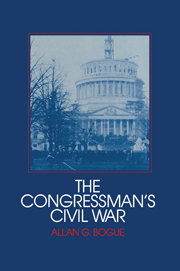Book contents
- Frontmatter
- Contents
- Acknowledgments
- Introduction
- 1 The paths of power: congressional career lines and the coming of war
- 2 Lincoln and the “disorderly schoolboys”: a chapter in executive–legislative relations
- 3 An “inquiring disposition”: the investigative process in the House of Representatives
- 4 “God alone can guide us”: authority structures in the House of Representatives
- 5 Conclusion
- Appendix: Representatives and senators who died in office, 1844–1865
- Notes
- Sources cited
- Index
1 - The paths of power: congressional career lines and the coming of war
Published online by Cambridge University Press: 07 September 2010
- Frontmatter
- Contents
- Acknowledgments
- Introduction
- 1 The paths of power: congressional career lines and the coming of war
- 2 Lincoln and the “disorderly schoolboys”: a chapter in executive–legislative relations
- 3 An “inquiring disposition”: the investigative process in the House of Representatives
- 4 “God alone can guide us”: authority structures in the House of Representatives
- 5 Conclusion
- Appendix: Representatives and senators who died in office, 1844–1865
- Notes
- Sources cited
- Index
Summary
During the 1850s, sectional stress fatally weakened the political structure that the Founding Fathers had so skillfully crafted some seven decades before. One eminent historian has used the word “disruption” to describe the fate of the dominant political party of the 1850s; another described the political leaders of that decade as a blundering generation. When Abraham Lincoln, the presidential candidate of the Republican party, won election in 1860 despite the fact that he obtained no electoral votes from below the Mason–Dixon line, most southern states seceded from the Union and formed the Confederacy. Efforts to compromise the sectional differences between North and South failed, and four years of internecine warfare followed. Finally the South capitulated; 620,000 soldiers had lost their lives; even more carried physical or psychic scars to their graves; slavery, which had been the major institutional distinction between the North and South, was ended – a great accomplishment – although the realities of racial distinction and discrimination would persist, even to today. The Civil War was the greatest trauma the American nation has ever suffered, and quite naturally historians have found the struggle and its political prelude to be subjects of keen and continuing interest.
The political history of the American middle period is complex, and scholars in search of greater understanding may bring many different perspectives to it. Political careers and the various institutional and social roles that made up the individual career course challenge our understanding.
- Type
- Chapter
- Information
- The Congressman's Civil War , pp. 1 - 28Publisher: Cambridge University PressPrint publication year: 1989

